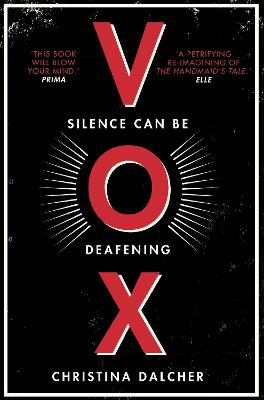2.5*
I have another case of the mixed feelings! This book is likened to The Handmaid's Tale, and I suppose that's accurate, in the fact that it's maybe a little too much like it? The society seemed almost identical- especially the way the society became as it did, seemed to mimic Handmaid's a lot. But certainly, there are differences. At any rate, there are things I liked and things I did not so much, so I suppose we might as well get to it.
The Things I Liked:
- It's definitely thought provoking. It's interesting to see this happening in "real time", if you will. And of course, just as The Handmaid's Tale (and other such dystopian nightmares) makes you think about what you'd do, how you'd react to these situations, so too does this book. The concept of silencing women is rather terrifying, obviously. The irony that they end up requiring a woman's voice is quite fun, too.
- The exploration of family dynamics was great. In a plotline akin to realizing your loved one voted for Trump, Jean has to deal with her son buying into the "values" of the Pure movement to silence women. Even her husband, who seems sympathetic, still has no real grasp of how this horror affects Jean or their daughter. And Jean's relationship with said daughter is probably one of my favorite aspects of the book.
- It was certainly the sort of book that propelled me to keep reading. Sort of in the sense that the world was so awful that I had to figure out what happened, I was motivated to continue reading. And it was a rather quick read.
The Things I Didn't:
- Jean is kind of The Worst™. Oh, Jean, it was hard to feel sorry for you sometimes. Now- no woman should be shocked for saying more than one hundred words of course, but Jean is definitely not a sympathetic main character. She makes some questionable choices throughout the book, which okay, I can understand- it is a dystopian nightmare after all. And honestly, I don't even think I was mad that she didn't really care a ton about her husband anymore? Jean didn't vote, and actually seemed to think that it absolved her because she didn't vote for the "bad guy". Like no honey, you're part of the damn problem. She's not a great advocate for other women; in fact she's often really judgy. I also didn't even mind that she cheated (though some of you might, so I'll throw that out there) since I kind of assume if you can't even speak, you can't file for divorce either. But what gets me is the way her other priorities (like being a mother) fell by the wayside. This is spoilery, so I'll hide it but when Jean became pregnant, she was willing to run away with her lover, despite the fact that she had a daughter already who was being subjected to this horror! Like hey Jean, what about HER?!)
- It portrays religion (namely Christianity) as a villain, but without any context of how or why it became such. Look, I am not religious, so it didn't offend me on any kind of personal level. I do feel though, that when singling out a group of people, you'd probably need to have a good reason to do so. In The Handmaid's Tale, which I am going to keep referencing since this is an idea it clearly contains, Gilead blossoms from a Christian sect. But it's much more developed, and the reasons, the method, are more clear. This is just... a couple dudes, from the sound of it? I might have been able to buy it if it were more developed, but it wasn't, so I didn't.
- The end was just so rushed and easy. I won't go into it much because again, spoilers, but I didn't love how it ended on quite a few levels. Not only did it seem way too quick, considering how deep into the whole mess they were, but it rubbed me the wrong way in general. This reverts back a bit to Jean being The Worst™, but it also just didn't satisfy me in general.
Bottom Line: Certainly a horrifying and thought provoking premise, but it comes up a bit short on development and execution.
